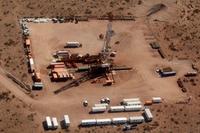-
International collaborative effort to develop better radiation detection tool
In mid-February, the Flash Portal Project was launched with the aim of furthering the development and testing of a new technology to detect shielded nuclear materials
-
-
Alternative to Keystone XL pipeline planned

The Obama administration rejected of the Keystone XL pipeline to carry Canadian oil to refineries on the U.S. Gulf coast, and now two companies are collaborating to develop an alternative plan to achieve the same end
-
-
Beef Industry Safety Summit notes successes, challenges
The U.S. beef industry says that beef is increasingly safe and that consumers have more confidence in beef safety, but challenges remain
-
-
2011 disasters: $116 billion in insured losses, record economic losses of $370 billion
Figures confirm that 2011 was the second-highest catastrophe loss year ever for the insurance industry: 2011 saw the highest economic losses in history, at $370 billion; the insurance industry experienced the second-largest insured losses ever, at $116 billion; 2011 also brought the highest insured earthquake losses, at $49 billion; flooding in Thailand resulted in the highest insured losses ever for a single flood event, at $12 billion
-
-
New laws help cut metal thefts

Metal thefts have become a plague to businesses throughout the country; some states pass laws which require licenses and permits to buy and sell non-ferrous metals; Spartanburg, South Carolina, also requires that buyers pay for the purchases with checks rather than cash, in order to create a paper trail to the seller of the metal
-
-
Developing crop for livestock in dry climates
Scientists at the University of Liverpool are working with international partners to develop new forage crop for the hot and dry climate of regions such as Pakistan and Saudi Arabia
-
-
BlackBerry smartphones equipped with iris recognition system
NFC-enabled Blackberry 7 smartphones will be equipped with iris recognition identification system; the credential can be presented for authentication by holding the NFC-enabled BlackBerry in front of an iCAM7000 series iris camera
-
-
PositiveID’s M-BAND fits the bill for $3 billion BioWatch program
DHS’s $3.1 billion BioWatch program aims to place biosensors on top of utility poles and buildings in major American cities in order to detect bioterror attacks; PositiveID says its M-BAND solution is well positioned to be picked up by DHS for the program
-
-
Detection technology detects viruses, pathogens within 24 hours
New detection technology could enable food safety professionals, law enforcement, medical professionals, and others to detect within twenty-four hours any virus or bacteria that has been sequenced and included among the array’s probes
-
-
zvelo reaches 100 OEM milestone
Pivotal milestone attributed to strong adoption of zvelo’s URL database, website categorization and malicious website detection solutions for a vast array of applications
-
-
MRIGlobal awarded $9 million to evaluate detection gear
Kansas City company in a $9 million contract with the U.S. Army to test and evaluate equipment to identify chemical, biological, and radiological hazards in the field
-
-
Arizona's illegal immigrant population takes a downward turn

The number of illegal immigrants in Arizona has declined in recent years, according to U.S. census data
-
-
Venture capital tutorial for New York-based homeland security companies
Long Island technology forum helps connect homeland security companies from the New York region with funding sources
-
-
Two RNA-based therapeutic candidates for Ebola, Marburg viruses
Under a contract for up to $291 million from the U.S. Department of Defense, AVI BioPharma has initiated clinical studies for two RNA-based drugs for the treatment of Ebola and Marburg viruses
-
-
Companies team up to develop carbon capturing
Three companies have teamed up to build a low-carbon, coal-based power plant in Scotland; the plant will include a carbon-capture and storage; with more than 90 percent carbon capture, the coal feedstock plant will generate extremely low-carbon electric power and also produce hydrogen gas for commercial use
-
More headlines
The long view
Factories First: Winning the Drone War Before It Starts
Wars are won by factories before they are won on the battlefield,Martin C. Feldmann writes, noting that the United States lacks the manufacturing depth for the coming drone age. Rectifying this situation “will take far more than procurement tweaks,” Feldmann writes. “It demands a national-level, wartime-scale industrial mobilization.”
Trump Is Fast-Tracking New Coal Mines — Even When They Don’t Make Economic Sense
In Appalachian Tennessee, mines shut down and couldn’t pay their debts. Now a new one is opening under the guise of an “energy emergency.”
Smaller Nuclear Reactors Spark Renewed Interest in a Once-Shunned Energy Source
In the past two years, half the states have taken action to promote nuclear power, from creating nuclear task forces to integrating nuclear into long-term energy plans.
